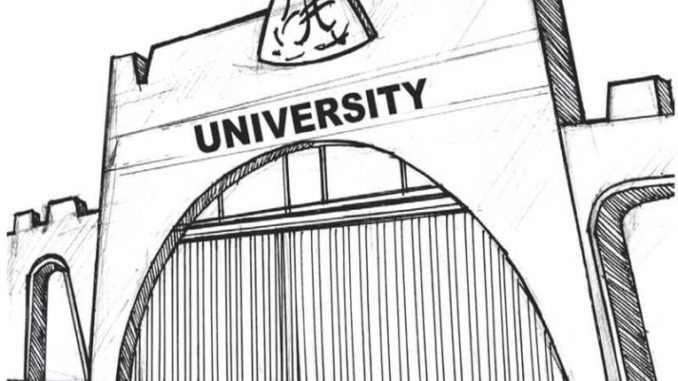
At the heart of the rot that currently ails Nigeria’s universities is the embarrassing gulf between our tertiary institutions and the organised corporate sector. Ordinarily, the fact that the ivory trains the workforce for the industry should naturally propel a symbiotic relationship between the two, but that isn’t the case in Nigeria, sadly. What is certain, however, is that no nation that can reach her full developmental potential when it lacks such dimension of synergy between both ends.
Universities, by their very nature, are a sacred temple of experimentation and knowledge production for development. On the other hand, the organised private sector and by extension, the public sector, exists to put to work, ideas founded on sound theoretical frameworks. Universities serve as inspiration and solution centres for growth and development.
Therefore, having entrenched synergy between both the town and the gown is to run a society that benefits from the dynamic cyclical flow of explanations and well-thought-out perspectives to presenting development challenges.
In many ways, we can argue that the reason why the nation has found herself at the backwaters of development is largely traceable to our uninspiring attitude to knowledge production. By extension, also, the helplessness of our industry is traceable to the weakness of the university. It is high time we realised that working together would mutually benefit both divides, leaving lasting impact on our society.
Statistics consistently show that there is an alarming paucity of capable hands to train Nigerian undergraduates. This is made even more disturbing by the fact that, based on the Needs Assessment Report of Nigerian Public Universities in 2012, Nigerian universities have a shortfall of well over 30,000 experts to man the various disciplines in the universities. This still remains a huge problem begging for attention. This accounts for the widening ratio between facilitators and students in our ivory tower. This shouldn’t be the case were we to have deepened partnership between our learning institutions and the industry. It is certain that there are a lot of intellectual resources that can be leveraged by the ivory tower that have remained dormant, because of the gulf, and perhaps, inflexibility of managers of our higher institutions.
There is no doubt that a key factor that has kept our institutions at bay and manifestly deficient, is the poor funding structure model. This, chiefly, among several others banes, has turned us into laughing stocks among the comity of nations. A visit to any of our institutions today is bound to leave any visitor stunned and disappointed, considering the profile of dilapidated structures, acutely archaic laboratories and decrepit facilities that litter the campuses. Whereas the Academic Staff Union of Nigerian Universities has consistently clamoured for an increase in the allocation made available to universities in the country – except for little drops here and there – this has not yielded much results. It is yet to be seen how the ongoing strike, now in its second month or so, would pan out.
Be that as it may, while we must insist that it is right and necessary to demand that government increase its funding of education in the country, it is also wise that we consider additional funding model. In this regard, the linkage between the town and the ivory tower becomes critical. Like it exists elsewhere the world over, the industry should reconsider how to support tertiary institutions in the country to deliver on the mandates of engaging in relevant, purposeful, qualitative research and the production of adequately trained workforce to support. Ultimately, it is a win-win situation, if this happens.
Of course, we must note that the kind of partnership academics crave for, will not happen automatically. For instance, as regards funding of researches, the ivory would have to consistently deliver alluring values that can attract the interest and financial commitment of the industry. The secret is in seeking to meet the urgent needs of the industry, particularly in terms of seeking solutions to issues that inhibit organisational productivity and buoying of the bottom line. In doing this, accountability, transparency and speed, which are some of the key values cherished in the organised private sector, must be taken seriously.
In this connection, also, the ivory tower should aggressively pursue synergies with professional organisations. The goal of this is the absorption of informed professional perspectives that can readily advance integrative and blended learning. Nothing should stop us, really, from appointing professionals who have distinguished and have impacted the field of practice in significant ways. This model, referred in some quarters, as the scholar-practitioner model, certainly promises to help our institutions to negotiate a radical departure from the theory-suffused model currently prevalent in our institutions.
Entrenching the culture of endowed professorial chairs in our universities is another sure way of deepening the relationship. Through focused funding of key research areas of immediate relevance to societal development, organisations and indeed privileged members of the society can support scholars and research in targeted areas. Kudos should go to such organisations and individuals such as Shell, UBA, Pastor E.A Adeboye, Mike Adenuga, Oba Sikiru Kayode Adetona for their leadership in this regard. It would be gratifying to have more Nigerians of means come in into this space and expand it.
Often times, we are quick to talk and admire the models of development in Europe, America and other developed climes. What we, however, fail to take into consideration is the value of shared responsibility that exists in those climes. Take for instance, the lure of the Silicon Valley, reputed as the foremost tech innovation hub in the world today. There is a need for critical rethink on the part of all stakeholders so that we forge a robust linkage between the industry and university in Nigeria.
Prof Ayobami Salami is the Pioneer Vice Chancellor of Technical University, Ibadan
END

Be the first to comment